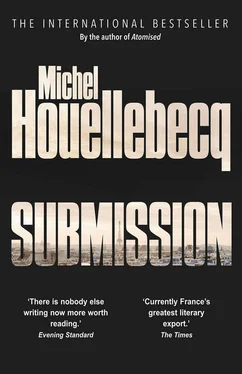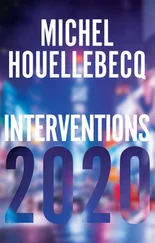Around ten that morning, I decided that it was a decent hour to ring the bell at 5 rue des Arènes. The same butler greeted me with a smile, still wearing his white Nehru suit. Rediger was out, he told me, and yes, I had indeed left something behind. Thirty seconds later, he brought me my Adidas bag. Rediger must have put it aside early that morning. He was polite, efficient and discreet. In a sense, I found Rediger even more impressive than his wives. He must have cut through red tape like a flash, with a snap of his fingers.
As I walked back along the rue de Quatrefages, I found myself — entirely by accident — in front of the Paris Mosque. My thoughts turned not to the ultimate Creator of the universe but, crassly enough, to Steve: clearly, they’d lowered their standards. I was no Gignac, but still, if I decided to go back to work, I could be sure they’d welcome me with open arms.
By contrast, my decision to keep going down the rue Daubenton, towards the Sorbonne-Paris III, was entirely conscious. I wasn’t planning to go in, I just wanted to walk past the gates, but I felt a pang of joy when I recognised the Senegalese guard. He was beaming, too. ‘Happy to see you, monsieur! It’s good to have you back!’ I didn’t have the heart to disabuse him, and so when he waved me through, I ventured inside the courtyard. I had spent fifteen years of my life at this school. I was glad to recognise one person, at least. I wondered if he’d had to convert, too, to get his job back. But maybe he already was a Muslim, some Senegalese are — at least I think so.
I spent fifteen minutes strolling under the arcades with their metal beams, slightly surprised by my own nostalgia and aware, at the same time, that the place really was extremely ugly. Those hideous buildings had been constructed during the worst period of modernism, but nostalgia has nothing to do with aesthetics, it’s not even connected to happy memories. We feel nostalgia for a place simply because we’ve lived there, whether we lived well or badly scarcely matters. The past is always beautiful. So, for that matter, is the future. Only the present hurts, and we carry it around like an abscess of suffering, our companion between two infinities of happiness and peace.
Gradually, after I’d walked around enough under the metal beams, my nostalgia faded, and I almost stopped thinking altogether. I did think of Myriam, briefly but very painfully, as I went past the snack bar where we first met. Nowadays, of course, all the female students wore veils, mainly white veils, and as they strolled in groups of two or three under the arcades, the place had the look of a convent — at any rate, the overall impression was undeniably studious. I wondered how it must be to see them in the older setting of Sorbonne-Paris IV, whether it felt like going back to the time of Abélard and Héloïse.
Ten Questions on Islam was indeed a simple book, and very efficiently structured. The first chapter, answering the question ‘What do we believe?’ didn’t have much to teach me. It was basically what Rediger had said the afternoon before about the vastness and harmony of the universe, the perfection of its design, etc. Then came a brief outline of the prophets, culminating in Muhammad.
Like most men, probably, I skipped the chapters on religious duties, the pillars of wisdom and child-rearing, and went straight to chapter seven: ‘Why Polygamy?’ The argument was original, I have to say: to realise His sublime plan in the inanimate world, the Creator of the universe used the laws of geometry (a non-Euclidean geometry, to be sure, a non-commutative geometry, but still a geometry). When it came to living beings, however, the Creator expressed Himself through natural selection, which allowed animate creatures to achieve their maximum beauty, vitality and power. And for all animal species, including man, the law was the same: only certain individuals would be chosen to pass on their seed, to conceive the next generation, on which an infinite number of generations depended. In the case of mammals, if you compared the female, with her long gestation period, to the male, with his essentially limitless capacity to reproduce, it was clear that the pressures of selection would fall principally on the males. If some males enjoyed access to several females, others would necessarily have none. So this inequality between males should be considered not a negative side effect of polygamy but rather its goal. It was how the species achieved its destiny.
These curious considerations led directly to chapter eight, ‘Ecology and Islam’. It was a less controversial chapter. As Rediger saw it, halal food was like a kind of improved organic diet. As for chapters nine and ten, which had to do with economics and political institutions, they seemed to have been written specifically in support of Mohammed Ben Abbes.
In this work, which was meant for a very broad readership, and which found one, Rediger made lots of concessions to the humanist reader. He spent a long time comparing Islam with the brutal herding civilisations that preceded it. He argued that Islam had not invented polygamy but rather had helped regulate it, that Islam was not the origin of stoning or female circumcision, that the Prophet Muhammad had urged masters to free their slaves, and that by establishing the principle that all men were equal before their Creator, he had put an end to racial discrimination in every land he conquered.
I knew all those arguments, I’d heard them a thousand times, though that didn’t mean they were wrong. But what had struck me during our meeting — and struck me even more now as I read his book — was that sense of hearing a well-rehearsed speech , which inevitably made Rediger sound like a politician. Politics hadn’t come up that afternoon on the rue des Arènes; but a week later I wasn’t surprised to see that, thanks to some minor ministerial reshuffling, Rediger had been named secretary of universities — a post they’d revived just for him.
In the meantime, I’d had occasion to discover that he was decidedly less cautious in his articles for more specialised magazines, such as the Review of Palestinian Studies or Oumma . The lack of curiosity displayed by journalists really was a blessing for intellectuals: all of these articles were easily accessible on the web, and in certain cases, it seemed to me, would have been worth the trouble of digging up. But I may have been wrong; over the course of the twentieth century plenty of intellectuals had supported Stalin, Mao or Pol Pot and had never been taken to task. For the French, an intellectual didn’t have to be responsible . That wasn’t his job.
In an article for Oumma , Rediger raised the question whether Islam had been chosen for world domination. In the end he answered yes. He hardly bothered with Western societies, since to him they seemed so obviously doomed (liberal individualism triumphed as long as it undermined intermediate structures such as nations, corporations, castes, but when it attacked that ultimate social structure, the family, and thus the birth rate, it signed its own death warrant; Muslim dominance was a foregone conclusion). He had more to say about India and China: if India and China had preserved their traditional civilisations, he wrote, they might have remained strangers to monotheism and eluded the grasp of Islam. But from the moment they let themselves be contaminated by Western values, they, too, were doomed: he detailed the process and offered a preliminary timetable. The article, cogent and well sourced, clearly betrayed the influence of Guénon, who drew the same basic distinction between traditional societies, considered as a whole, and modern civilisation.
In another article, Rediger made a case for highly unequal wealth distribution. Although an authentic Muslim society would have to abolish actual destitution (alms-giving was one of the Five Pillars of Wisdom), it should also maintain a wide gap between the masses, who would live in self-respecting poverty, and a tiny minority of individuals so fantastically rich that they could throw away vast, insane sums, thus assuring the survival of luxury and the arts. This aristocratic position came directly from Nietzsche; deep down, Rediger had remained remarkably faithful to the thinkers of his youth.
Читать дальше







